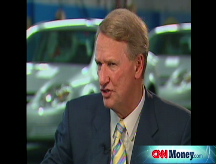The deepening auto recession
A variety of woes may delay any recovery until 2010 - or beyond.
 |
| The plummeting value of used SUVs and trucks is keeping new buyers out of the showrooms. |
NEW YORK (FORTUNE) -- In the darkened cocktail lounge of a midtown Manhattan hotel early one recent evening, the gloomy atmosphere matched the mood of the Detroit executive who was nursing a beer. Auto sales are being ravaged by the toxic combination of plummeting housing prices, expensive consumer credit, and cratering used car values. And the economic forecast offers little hope of a recovery over the next 15 months
The conversation with the executive was off the record, but the array of negative indicators facing the industry is there for anyone to see:
- Potential new car and truck buyers are being kept out of the market because falling resale values mean they don't have any equity in their current vehicles. Dealers call these customers "upside down." The upside down effect is likely to become most apparent later this fall when Ford (F, Fortune 500) and Chrysler launch the latest versions of their most profitable vehicles - the Ford F-150 and Dodge Ram full-size pickup trucks - because truck trade-in values have been especially hard hit.
- At the same time, leasing is disappearing as a sales stimulant because 1) manufacturers like Chrysler can no longer afford to finance it, and 2) falling resale values - especially on larger vehicles - make it unattractively expensive. Lots of new car buyers are dependent on an affordable monthly payment and leases can't provide that any longer. Home equity loans, once a popular way to pick up the slack, aren't helping either. According to Oregon-based CNW Marketing Research, the reduction in the number of purchases made with home equity loans has been especially steep in California and Florida, where a huge number of new cars and trucks are sold.
- Analysts at CSM Worldwide in Detroit are now saying that all these factors, combined with sagging consumer confidence, could delay the industry's recovery for years. One scenario has sales remaining below their 2007 sales level of 16.1 million until as late as 2013. Even when the market does start to recover, the hottest segments - like compact-sized cars and crossover vehicles - will be far less profitable than shrinking segments like pickups and SUVs.
For the past several months, industry executives had expected to see an improvement in their business prospects in 2010, when new models arrive, the economy brightened and a lower-wage union contract kicked in. But doubts are creeping into the forecast that could push recovery further into the future.
For instance, Ford's highly touted new small cars from Europe, the Fiesta and the Focus, may encounter resistance from consumers who are not used to paying premium prices for subcompact and compact cars.
At Chrysler, analysts are questioning whether the introduction of "seven major new models" in 2010 will be sufficient to reverse negative perceptions about the company, whose sales fell 34.5% last month.
And observers are baffled by General Motors' (GM, Fortune 500) decision to unveil the production version of the 2010 Chevrolet Volt two full years before its introduction. They are equally skeptical about the business prospects of the plug-in hybrid car. To ensure the Volt has a long-enough range, GM has adopted an architecture for the car used by no one else in the industry and may have to sell it for more than $40,000. That would erase any economic advantage that comes from saving gas with the new technology.
Even the prospect of Congress appropriating $25 billion in low-cost loans to accelerate the changeover to more fuel-efficient vehicles isn't enough to cut the gloom. As Efraim Levy, an analyst at Standard & Poor's writes: "In our view, the loans would be net near-term positives to car and parts makers, but would increase borrowing costs and obligations in the future."
It is hard to imagine a bleaker picture. As another longtime Detroit executive said last week: "Six months ago, car buyers were upside down on their car loans. Today, they are upside down on their lives." ![]()
-
 The retail giant tops the Fortune 500 for the second year in a row. Who else made the list? More
The retail giant tops the Fortune 500 for the second year in a row. Who else made the list? More -
 This group of companies is all about social networking to connect with their customers. More
This group of companies is all about social networking to connect with their customers. More -
 The fight over the cholesterol medication is keeping a generic version from hitting the market. More
The fight over the cholesterol medication is keeping a generic version from hitting the market. More -
 Bin Laden may be dead, but the terrorist group he led doesn't need his money. More
Bin Laden may be dead, but the terrorist group he led doesn't need his money. More -
 U.S. real estate might be a mess, but in other parts of the world, home prices are jumping. More
U.S. real estate might be a mess, but in other parts of the world, home prices are jumping. More -
 Libya's output is a fraction of global production, but it's crucial to the nation's economy. More
Libya's output is a fraction of global production, but it's crucial to the nation's economy. More -
 Once rates start to rise, things could get ugly fast for our neighbors to the north. More
Once rates start to rise, things could get ugly fast for our neighbors to the north. More











